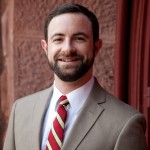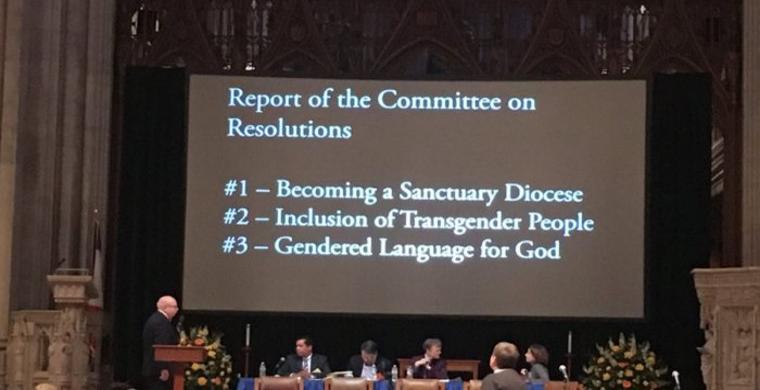DC Episcopalians Opt for Open Borders and Transgenderism, Eschew Gendered Pronouns for God
A trifecta of resolutions introduced and passed by the Episcopal Diocese of Washington’s annual convention confirm a further politicized and progressive direction in which the denomination is headed.
By Jeff Walton
https://juicyecumenism.com/
January 29, 2018
Embracing progressive themes, delegates to The 123rd Diocesan Convention approved legislative proposals “On Becoming a Sanctuary Diocese: Offering Sacred Welcome to Immigrants,” “On Inclusion of Transgender People,” and “On the Gendered Language for God” at the Washington National Cathedral on Saturday, January 27.
Resolutions were passed in under one hour and were introduced by a small number of delegates. The Rev. Kimberly Lucas, Rector of St. Margaret’s Episcopal Church in Washington, D.C., and a graduate of liberal Union Theological Seminary in New York, sponsored all three resolutions. Two of the three resolutions were submitted by The Rev. Alex Dyer, rector of St. Thomas’ Episcopal Parish in Washington, D.C. Dyer was briefly notable last year on social media for wrapping banners around construction fences at St. Thomas in which an image of a face-palming Jesus was accompanied by political messages including the tagline “a progressive church for a progressive city.”
According to statistics made available by the Episcopal Church, St. Thomas has declined precipitously in the past five years, shrinking from a weekly attendance of 150 down to 75 (-50%). St. Margaret’s has similarly declined from approximately 240 attendees in 2006 down to 130 (-46%).
In the past decade, weekly attendance in the Diocese of Washington has declined 17 percent. Meanwhile, baptisms have dropped 35 percent and weddings have declined 39 percent. In April, the diocesan clergy conference will hear from an organization assisting churches “to move from a place of plateau or decline to sustained congregational health.”
“Sacred Welcome”
Resolution #1 “On Becoming a Sanctuary Diocese: Offering Sacred Welcome to Immigrants,” was endorsed by the Race and Social Justice Task Force of the Diocese. It read:
Resolved, that the people of the Diocese of Washington, as disciples of Jesus Christ and persons of faith and conscience, take seriously the biblical mandate not to wrong or oppress the alien in our midst, and in faithfulness to our Baptismal Covenant, oppose the policies of the incumbent Executive Branch that target undocumented immigrants for deportation while also placing undue restrictions on refugees seeking safe haven in the U.S.
The resolution was amended to remove reference to the presidency and to change “alien” to “immigrant” out of concern that the former term had a negative connotation (resolutions can be viewed in full here: https://www.edow.org/files/4315/1630/5410/Booklet_2018_FINAL.pdf )
Resolution drafters asserted, “Its passage would send a message of solidarity to the hundreds of immigrants in our midst.”
Transgender Persons
Resolution #2, “On Inclusion of Transgender People” calls upon the diocese to “encourage all parishes to remove all obstacles to full participation in congregational life by making all gender-specific facilities and activities fully accessible, regardless of gender identity and expression.”
Resolution drafters cited the Episcopal Church Baptismal Covenant wording “Will you strive for justice and peace among all people, and respect the dignity of every human being?” as a basis for transgender advocacy. The statement quickly dived into intersectionality theory, charging “that the intersections of racism, sexism, homophobia and transphobia give rise to discrimination” and that “Fixed boundaries of gender identity are being challenged and churches need to respond.”
The resolution was adopted without debate or discussion.
Gendered Language
Resolution #3, “On the Gendered Language for God,” related to Book of Common Prayer revisions that will potentially be considered by the national church at General Convention this summer:
“…eliminate, when possible, all gendered references to God and to replace them with gender neutral language, and if necessary, to alternate gendered titles when referring to God.”
The resolution was amended to read “…if revision of the Book of Common Prayer is authorized, to utilize expansive language for God from the rich sources of feminine, masculine, and non-binary imagery for God found in Scripture and tradition and, when possible, to avoid the use of gendered pronouns for God.”
“Over the centuries our language and our understanding of God has continued to change and adapt,” the resolution drafters asserted. “Our current gender roles shape and limit our understanding of God. By expanding our language for God, we will expand our image of God and the nature of God. Our new Book of Common Prayer needs to reflect the language of the people and our society … language should not be limited by gendered pronouns when avoidable.”
Clergy delegate The Rev. Linda R. Calkins from St. Bartholomew’s Episcopal Church in Laytonsville, Maryland, brandished a copy of The Inclusive Bible: The First Egalitarian Translation and asked when the Episcopal Church would join with those behind the 2004 translation.
Reading from Genesis Chapter 17, in which God tells Abraham “I am El Shaddai,” Calkins asserted “if we are going to be true to what El Shaddai means, it means God with breasts.”
El Shaddai is traditionally translated to mean “God Almighty,” but The Inclusive Bible reads “...and God said, I am the breasted one.”
“Having studied much feminist theology in my masters’ degrees, I wrote a thesis on liberation and freedom and non-equality in feminist theology and existential counseling,” Calkins told the convention. “And I am still waiting for the Episcopal Church to come to the place where all people feel that they can speak God’s name. Many, many women that I have spoken with over my past almost 20 years in ordained ministry have felt that they could not be a part of any church because of the male image of God that is systemic and that is sustained throughout our liturgies. Many of us are waiting and need to hear God in our language, in our words and in our pronouns.”
 Jeff Walton writes about the Episcopal Church for Juicy Ecumenism and the Institute of Religion and Democracy.
Jeff Walton writes about the Episcopal Church for Juicy Ecumenism and the Institute of Religion and Democracy.
*****
U.S. Episcopal diocese votes to stop using masculine pronouns for God
WASHINGTON, D.C., February 1, 2018 (LifeSiteNews) -- The Episcopal church in the Diocese of Washington, D.C., passed a resolution last week to stop using masculine pronouns for God in future updates to its Book of Common Prayer.
The resolution to stop using "gendered language for God" was passed quickly by delegates to the Diocese's 123rd Convention.
"If revision of the Book of Common Prayer is authorized, to utilize expansive language for God from the rich sources of feminine, masculine, and non-binary imagery for God found in Scripture and tradition and, when possible, to avoid the use of gendered pronouns for God," the resolution stated.
"Over the centuries our language and our understanding of God has continued to change and adapt," the drafters of the resolution stated. The drafters said that referring to God using masculine pronouns is to "limit our understanding of God."
"By expanding our language for God, we will expand our image of God and the nature of God," they stated.
But Clergy delegate The Rev. Linda R. Calkins from St. Bartholomew's Episcopal Church in Laytonsville, Maryland, challenged the delegates to go further.
Calkins read from Genesis Chapter 17, in which God tells Abraham "I am El Shaddai." She said that if Episcopalians "are going to be true to what El Shaddai means, it means God with breasts."
"Having studied much feminist theology in my masters' degrees, I wrote a thesis on liberation and freedom and non-equality in feminist theology and existential counseling," Calkins told the delegates, as reported by The Institute On Religion & Democracy.
"And I am still waiting for the Episcopal Church to come to the place where all people feel that they can speak God's name. Many, many women that I have spoken with over my past almost 20 years in ordained ministry have felt that they could not be a part of any church because of the male image of God that is systemic and that is sustained throughout our liturgies. Many of us are waiting and need to hear God in our language, in our words and in our pronouns," she added.
Christians, following the teachings of Jesus Christ, have prayed to God as "Our Father" from the very beginning. Theologians explain that the masculine word "Father" indicates a relationship.
"Jesus did not call God 'Imma' (Mother), but always and exclusively 'Abba' (Father)," Dr. Paul Tarazi of St. Vladimir Orthodox Theological Seminary explained. Indeed, "Father" is the only way Jesus ever referred to God, and the only way He taught His followers to do so.
The Church Fathers attest to this. St. Gregory the Theologian explained the name "Father" is proper to God, not a figurative concession to humanity. St. Athanasius the Great stated that only the specific names "Father," "Son," and "Holy Spirit" belong "to God's own essence and being." St. Gregory of Nyssa taught that deviation from the names "Father," "Son," and "Holy Spirit" causes deviations from the one true faith. Any other names, St. Gregory wrote, "serve as a starting point for the deflection of sound doctrine."
Delegates to the Episcopalian convention also passed a resolution without debate or discussion to include "transgender people" in all aspects of "congregational life ."
The resolution called on diocese to "encourage all parishes to remove all obstacles to full participation in congregational life by making all gender-specific facilities and activities fully accessible, regardless of gender identity and expression."
"Fixed boundaries of gender identity are being challenged and churches need to respond. This resolution is a clear response to the systematic oppression and violence that transgender people experience on a daily basis," the resolution drafters stated.
*****
37 Episcopalians Remaining On Planet Vote To Stop Using Male Pronouns For God
www.Babylonbee.com
February 5, 2018
WASHINGTON, D.C.--The last surviving members of the Episcopalian religion voted last week to stop using male pronouns for God, sources at a meeting of the Diocese of Washington, D.C. confirmed.
The 37 remaining Episcopalians on Planet Earth conducted the vote in an effort to make the last three or four Episcopal churches in the country be more inclusive, in the rare case anyone actually showed up to any of their services.
"We don't want to offend or trigger the six or seven people left in our pews," said the writers of the resolution. "And we get literally dozens of visitors every decade--what if we scare one of them off by reading the Book of Common Prayer and forcing them to hear the words 'He' or 'Him'? That's a chance we just can't take."
At publishing time, fourteen of the attendees of the meeting had left the faith.














